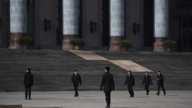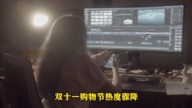【新唐人2013年01月04日訊】2012年,中共從地方黨委到中央委員會的大換屆,換得驚心動魄。而在踏入2013年的首季,又有從地方人大到全國人大的換屆。有評論認為,今天的中國,公民意識抬頭, 中共為鞏固自己的執政地位,新領導層還需要獲取最大的民意支持,因此, 中共的換屆工程既要合黨心,又要順民意,再加上黨員幹部全面和深度的腐敗,中共的「換屆」有它的難度。
據了解,中共「十八大」的人事佈局共有三波:繼七名政治局常委亮相之後,地方的所謂「一把手」也相繼大換班;接下來,中央機構和國務院部委領導的換屆,將在3月的「兩會」後完成。
攸關中國「政府部門」換屆交班的「全國人民代表大會第一次會議」,將於3月5號在北京召開。會議將選出新的國家主席和副主席、以及國家中央軍委主席,並決定國務院總理等政府組成人員;而省級人大會議將決定省級政府的重組。
國務院預料仍是團派天下。李克強鐵定當總理,汪洋及劉延東擔任副總理。無一例外的還有,中國共產黨的那些領導,再次成為中央政府的領導,和地方上各級政府的領導。
美國《世界日報》新聞網站的社論指出,到目前為止,中共最大的政治任務,仍是鞏固自己的執政地位,所以從中央到省級地方,關鍵職位全部由中共中央委員、中央候補委員出任。
時政評論家孟淵沛指出,中共一貫「黨決定一切」,所以每次換屆,都在貫徹執行這麼一個慣例。
時政評論家孟淵沛:「所謂的兩會:人民代表大會、政協會議,基本上就是落實十八大的意圖,比方說政治局常委已經選好了,這裡邊有一個人會擔任人大委員長,在政協會上會擔任政協主席,就是俞正聲,他們說,人大的委員長可能是張德江。他們兩個都是政治局常委。人家這個黨決定好了,它就馬上……他的人大班子、政協的班子、國務院的班子,國務院總理可能是李克強,這些班子就規劃好了。」
孟淵沛認為,新的一年,中共當局仍然沒有任何政治體制改革的跡象。
孟淵沛:「就是它明天死的話,今天也不會改,就會按照它的這樣一個很腐朽的、沒落的體制繼續運轉,因為這樣做下去,它才能感覺到避免馬上會死,所以就是說:沒新意,只能是加劇它死亡。」
《世界新聞網》評論,今天的中國,雖然還沒有成為民主社會,但已進入公民社會,社會思想意識已多元化。當局對民意的掌握,成為所謂「最大短板」。又由於中國從政治、經濟上,都已步到轉捩關口,新領導層需要獲取最大的民意支持,於是「換屆工程」既要合黨心,又要順民意,是為最大難點。
社論說,中共「換屆」的內在恐懼和深層難度,「來自執政黨中共自身,那就是黨員幹部的全面和深度的腐敗。中共十八大的經驗證明,既然作為中共中央政治局常委、政治局委員的人選,都可以是極度腐敗份子,還有甚麼事不可能呢。」
時事評論員 藍述:「明年有可能出現甚麼意外呢?現在是一個資訊非常發達的時代,中共目前上上下下官員都腐敗的不得了,民眾可以上網去公開他們所知道的這些中共領導人的腐敗行為,一旦公開之後,最有可能發生的就是:各個利益集團之間,通過打擊與自己利益集團有矛盾的其他利益集團的候選人,而引起中共政局的不穩,這是最有可能發生的事情,也是中共最害怕看到的事情。」
時事評論員藍述還表示,這裡面體現兩個利益衝突,一個是中共腐敗與民眾要求保護自己權益之間的利益衝突, 同時,在不民主的制度之下,中共黨內還有不同利益集團之間的利益鬥爭,這兩個利益鬥爭交錯在一起,很可能帶來換屆過程中的政局不穩。
採訪/陳漢 編輯/周平 後製/蕭宇
Headache for Beijing Regime’s Leadership Change in 2013
2012 saw local and central leadership changes
within the Chinese Communist Party (CCP) regime.
In March 2013, a power transition will be held
for CCP’s local and national people’s congress.
Commentators say that the rise of civic consciousness in
China has forced new CCP leaders to gain pubic support.
However, the regime is facing difficulties.
This is because its “power handover project” has
to satisfy both the Party and the general public.
In addition, it faces the reality of
full-scale and deep official corruption.
There are three tiers for new leadership changes for the
CCP’s 18th Party Congress, according to news reports.
The first tier is the seven top politburo leadership team.
The second is that of regional CCP Party chiefs.
The third is of leaders in CCP central agencies
and, in the State Council ministries.
The third tier handover will be completed right
after the CCP “Two Sessions” in March 2013.
The first session of the CCP National People’s
Congress will be held on March 5, 2013 in Bejing.
The meeting will select the Peoples Republic
of China’s new President, Vice President,
and head of the Central Military Commission.
It will also finalize the CCP regime’s new
Premier and government leadership.
CCP Provincial People’s Congress
will also appoint local authorities.
The CCP Youth League faction is expected to retain
a majority of seats in the new State Council leadership.
Li Keqiang is deemed to be the Party’s next premier.
Wang Yang and Liu Yandong will become vice premiers.
Without exception, all CCP central and regional
authorities will be under the lead of CCP leaders.
An editorial published on ‘worldjournal.com’ said that
the CCP’s priority political task is still to cement its helm.
Thus, key positions in CCP central and local
authorities are all filled by members and
alternate members of the CCP Central Committee.
Political critic Meng Yuanpei indicates that the CCP
always holds that “the Party has the final say.”
This convention is just followed in every
generation of its power transition.
Meng Yuanpei: “The CCP two sessions
is referred to the National People’s Congress
and People’s Political Consultative Conference.
Both are held primarily for the implementation
of the aims proposed at the 18th Party Congress.
For example, one of the new CCP Politburo
Standing Committee members will serve
as head of National People’s Congress.
Another will be chairman of the
Political Consultative Conference.
It is said that Zhang Dejiang and Yu Zhengsheng
have been slated to fill the role, respectively.
Both are members of CCP Politburo Standing Committee.
The Party has finalized the to-be leaders in the
National People’s Congress, People’s Political
Consultative Conference, and in its State Council.
Li Keqiang is expected to be next Premier.”
Meng Yuanpei says that entering a new year, the CCP
regime shows no sign of implementing political reform.
Meng Yuanpei : “It won’t be changed
even at the last minute.
It will remain in operation by following
its rotten and decaying mechanism.
This makes it feel that it won’t collapse right away.
In short, it won’t come up with new ideas, but the
further operation will only accelerate its demise.”
‘Worldjournal.com’ commented that today’s China has
become a civil society, with diversified social ideology.
It said that the CCP authorities’ control over public
opinion is the limiting factor that weakens it most.
China has come to a turning point
in both politics and economics.
Its new leadership needs to gain great popular support.
The biggest difficulty for the CCP “leadership handover
project” is how to satisfy both the Party and general public.
The editorial stated that the inner fear and underlying
difficulty is “derived from the ruling party itself.”
“That is, the Party members’ are deeply corrupt.”
“The CCP 18th congress has proved that
candidates for the Politburo Standing Committee
and for the Politburo can be extreme corrupt.”
“In this case, anything can happen in the future.”
Critic Lan Shu: “Will any unexpected things happen in 2013?
Now we’re living in a very well-developed information era.
The CCP officialdom is filled with corruption, but
civilians can disclose officials scandals on the internet.
Once it’s publicly exposed, the most likely to occur is
attacks against candidates from conflicting interest groups.
This will trigger CCP regime instability, and is most
likely to occur, and is what the CCP fears most."
Lan Shu adds that there’re two
conflicts of interests involved.
One is between CCP corruption and the
public defending their own rights and interests.
The other is infighting among different
CCP factions or interest groups.
These two struggles to gain interests are
intertwined, which is likely to cause the CCP
regime instability during its power transition.



























